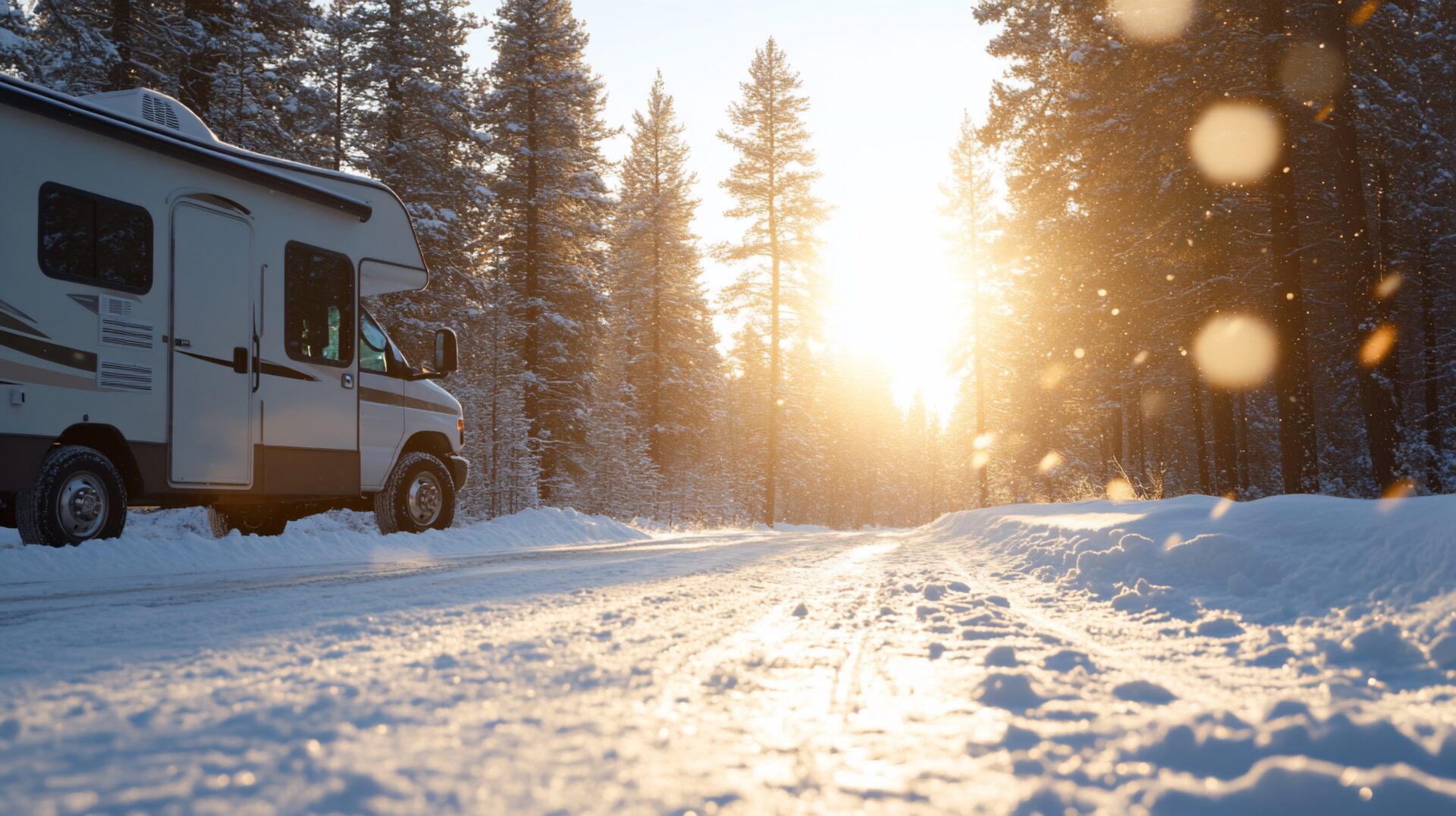Preparing Your Motorhome for a Winter Getaway: Maintenance and Travel Hacks
Posted: 15/01/2025 Author: Jackie ShipleyTags: motorhomes, plan your trip, winterising
When the temperature drops and landscapes turn into winter wonderlands, most motorhomers accept that the coldest season might not be the most appealing. They decide to carefully wind things down and follow the winterisation process, then putting their vehicles away until spring comes round.
However, winter motorhome travel can actually be some of the most rewarding you’ll take. To make sure of smooth and safe journeys during winter, it’s really important to prepare your motorhome properly for the conditions. This involves more than just the usual winterisation process. It also involves maintenance and taking account of a few winter-specific travel hacks.
In this edition of our blog, we’ll guide you through your essential prep, and share some all-important safety and navigation advice.
Winterisation
Winterising a motorhome refers to the steps you take to protect the vehicle when you’re storing it away during the colder months. However, if you plan to use it over the winter, the process of winterisation becomes slightly different. It’s then about ensuring the vehicle is fit for travel in freezing conditions. This will include safeguarding the plumbing, heating system and fuel efficiency while also making sure of the vehicle’s ability to handle snow, ice and extreme temperatures.
- Plumbing: Freezing temperatures can cause serious damage to the plumbing system aboard a motorhome, especially the pipes, water tanks and waste systems. The first step to avoiding this is to ensure your water system is well-protected. Before hitting the road, you should drain the water tanks and pipes to avoid any risk of freezing.
If you plan to use water during your trip, think about using an insulated water hose and keeping it indoors when it’s not in use, to prevent freezing. In some cases, using a non-toxic antifreeze designed for motorhomes can provide added protection for your water system. Flush the antifreeze through your pipes to help avoid freezing. If you’ll be staying in freezing conditions, it’s a good idea to insulate your waste tank, as waste freezing can quickly cause blockages. Using heated hoses and insulated covers will protect the system.
- Heating: Due to lower temperatures during the colder months, winter travel demands a reliable heating system. The last thing a traveller needs is a malfunctioning heating system when temperatures drop drastically. Make sure to check your heating unit before you set off, whether it’s a gas, electric or diesel-powered system.
Dust and debris can build up in the vents and ducts, reducing the efficiency of your heating system. You should clean these areas regularly, making sure that the heating vents are unobstructed. A full fuel tank is essential for reliable heating during your trip and, in colder weather, it’s advisable to carry extra fuel to avoid running out in remote areas. Turn on your heating system a few days before your trip to ensure it’s working correctly. If you find any issues, get them addressed well before your departure.
- Tyres: Cold temperatures can significantly affect your motorhome’s tyres, reducing pressure and traction. Proper tyre maintenance is critical for safe driving on icy or snowy roads.
You should check the tyre pressure on a regular basis. As a rule of thumb, tyre pressure drops in cold weather, so check your tyres frequently and adjust pressure accordingly (always following the manufacturer’s recommendations). If you’re heading to areas that are likely to experience heavy snow or ice, consider investing in winter tyres, which offer superior grip in extreme conditions. Even if you have winter tyres, carrying snow chains in case you encounter deep snow is wise. Make sure you know how to use them before you need them.
Essential Maintenance
Winter travel puts additional strain on your motorhome in various ways, so doing a series of maintenance checks on a regular basis is crucial. You can keep an eye on things and ensure that everything is running smoothly during your trip. Your checks should be done before each journey to avoid unpleasant surprises on the road.
- Battery: Cold temperatures can drain your motorhome’s battery quite quickly, leaving you without power for lights, heating or appliances. Before you travel, check the condition of the battery. Dirt and corrosion on battery terminals can prevent proper connection, so clean the terminals and make sure the battery is securely fitted. If the charge is weak, replace it before your trip. Carry a jump-start kit just in case.
- Fuel system: In cold conditions, fuel systems can become more prone to problems, especially if you’re running low on fuel. Keep your fuel tank full or close to full to help prevent condensation (which can lead to water entering the fuel system and freezing in the lines). Make sure to fill your tank whenever it’s half empty. Inspect fuel filters and replace if necessary. Dirty or clogged filters lead to poor performance or engine failure.
- Windscreen and wipers: Winter weather can bring rain, snow, and frost, making it really important to keep your motorhome’s windshield and wipers in good working order. Ensure wiper blades are free from cracks or damage, and if they’re worn out replace them before your trip. Top up the washer fluid. Use winter washer fluid that’s designed to prevent freezing and clear away snow, ice or salt.
Safety and Navigation Tips
When you’re setting off on some exciting winter motorhome travel, you’re likely to face driving challenges that are somewhat unique. These are likely to include icy roads, poor visibility and unpredictable weather. All of them require extra caution.
- Plan ahead: Before setting off, it’s essential to plan your route carefully. Winter weather can cause unexpected road closures or delays, so check forecasts regularly. Monitor weather apps and websites to stay updated on road conditions, snow forecasts and potential hazards on your chosen route. Avoid roads that are prone to heavy snow or ice build-up. If you plan to travel in remote areas, research snow-clearing schedules and emergency services along your route.
- Slow and steady: Winter conditions demand a more cautious driving style. Slippery roads can cause your motorhome to lose traction more easily, so reducing your speed and driving steadily is important. Allow more space between your vehicle and others on the road, as it will take longer to stop on icy roads. Use lower gear, too – when you’re driving uphill or downhill, they will help you to maintain control of your motorhome.
- Emergency kit: Even with careful planning, there can be unforeseen situations. Having an emergency kit on hand can help you respond to emergencies quickly. Include items like a first aid kit (plasters, bandages, medicines etc), a flashlight, extra blankets, a portable charger, non-perishable snacks and water. Keep a shovel and ice scraper handy on the motorhome for clearing snow and ice.
Comfort Hacks
Staying warm and comfortable in your motorhome during winter is just as important as maintaining your vehicle.
- Insulate: Keeping the cold at bay is essential for a pleasant time in your motorhome. Insulation can help retain heat and reduce energy consumption. Install thermal curtains or window covers to keep warmth in (and cold out). These also help block out drafts from windows. Use rugs or carpets on the floor to add an extra layer of insulation. This can be especially important when parked on snow or frozen ground.
- Portable heaters: While your motorhome’s built-in heating system should do a decent job for you, it can also be helpful to take along a portable electric heater for extra warmth. Look for one with safety features (automatic shut-off and tip-over protection).
- In bed: During chilly nights, warmth in the bed is essential. Use extra blankets or sleeping bags rated for low temperatures. An electric blanket can also be a good option, as long as you’re connected to an appropriate power source.
Winter motorhome travel can be a truly exhilarating way of exploring, with sights you won’t see at any other time of year. However, winter travel does come with a unique set of challenges. By taking the time to properly winterise, doing essential maintenance checks and adopting some of our comfort hacks, you should be sure of a safe and enjoyable getaway to your winter wonderland. Find your nearest Coachman dealer to find out more.


